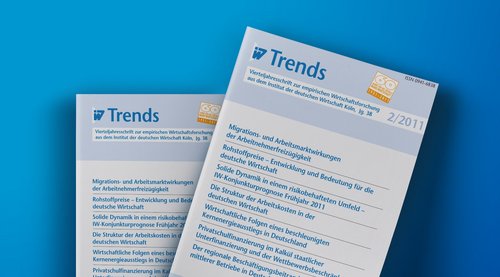In 2010, the rise in total annual labor costs per full-time employee in the German industry more than compensated the drop due to the recession the year before. In West Germany, labor costs rose by 4 percent to 56,700 euro and in East Germany by 3.2 percent to 37,740 euro. The down and up in the last two years was a result of the fluctuation in the hours worked. In 2009, widespread short-time work and less overtime reduced the number of paid hours significantly. In 2010, this trend was reversed leading to longer hours of work again. The prominence of short-time work and insolvencies in 2009 also changed the cost structure by reducing the share of direct earnings within total labor costs. In the service sectors examined, transportation and trade had the lowest labor costs with 41,450 euro and 42,900 euro, respectively, whereas labor costs in free-lance, scientific and technical services (62,060 euro) as well as in the financial sector (73,860 euro) were significantly higher than those in the industry.

Labor Costs in Germany

More on the topic

The 9th IW Survey of Further Training
In 2016 some 85 per cent of companies in Germany were active in continuing vocational training, using a broad mix of methods.
IW
Has the German Economy Reached its Limit?: Skilled Labour Shortages as a Brake on Growth
The German economy is performing significantly better than was expected in the first few months of this year. During the course of 2017, certain early fears – especially of a weakening of the global economy due to increasing protectionism – have proved ...
IW